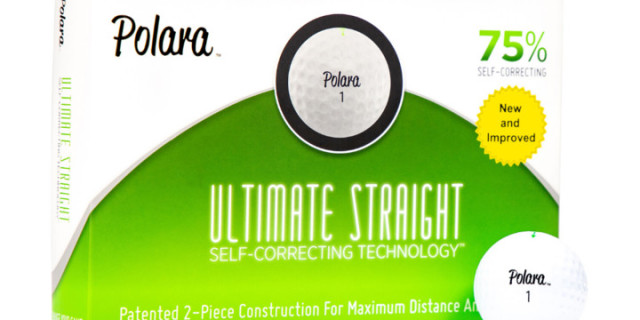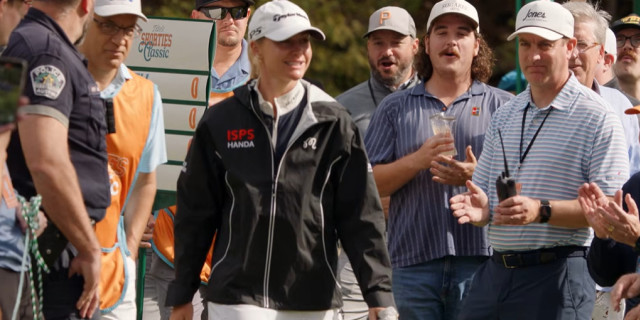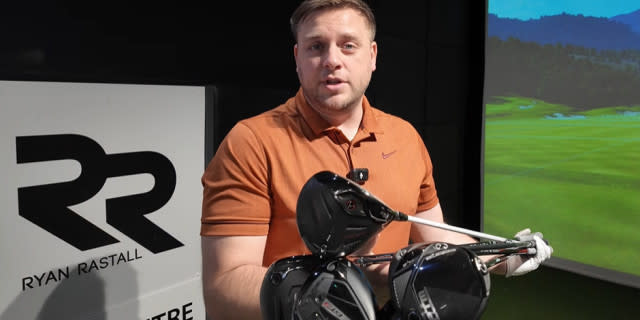
A Round With A Golf Ball That Only Flies Straight
Will Trinkwon Reviews the Polara Ultimate Straight Golf Ball
What if there was a golf ball that ensured that no slice or hook would go more than 20 or so yards off-line? So that as long as you struck the shot solidly, and your swing was on plane, your shot would go more or less straight? Well, according to www.polara.com, the website of golf ball maker Polara, there is: it’s called the Polara Ultimate Straight and it claims to reduce hooks and slices by up to 75%, so that it’s almost impossible not to produce a straight shot.
As a recovering 3 handicapper tempted by dreams of shooting low scores again without any effort, I was intrigued enough to buy a box and put them into play for a few rounds. They weren’t cheap – £60 on eBay (!) – but this exercise allowed me to test the Polaras for myself. And having now hit hundreds of shots with them, this is what I’ve discovered.
The first thing to say is that the Polara Ultimate Straight balls WORK. If you’ve watched some of the YouTube reviews of Polara balls by content makers such as Golf Mates, you might be sceptical about their effectiveness. A golf ball that only flies straight sounds too good to be true. And, in some ways it is, because, as I’ll explain, playing with the Polaras didn’t suddenly turn me into a plus handicapper. They do, however, dramatically reduce sidespin. It is very VERY difficult to hit more than a 5 or 10-yard hook or slice while playing with these balls. I have now played 11 rounds using the Polaras and have lost just one, and that was because of a wrist injury rather than a bad swing.
How They Work
Using the Polaras is very simple, if a little annoying. While I don’t pretend to be au fait with the precise science, each Polara has a cluster of additional, shallow dimples on the sides of the ball which react differently to airflow and reduce sidespin, allowing the ball to ‘self-correct’ in mid-flight. The downside is that this does mean that before every shot, and, yes, this includes on the fairway, you need to line up the Ultimate Straight line on the ball with your target, ensuring that the shallow dimples are on the sides. If you don’t do this, Polara says, the Ultimate Straight balls act like every other ball – they fly wonky. But I have to admit that it is a bit of a faff stopping every shot to swivel the line into the correct spot, although it’s much less of a hassle on tee shots.
Obviously, all this also means that the balls aren’t much good for competitions and they are not USGA legal. These balls are for the recreational player, not tournament play (indeed I question why players who are serious about improving their golf games would want to use them anyway).
Who Should Use Them
If you’re like me, whenever you hear that a product is meant for “recreational” golfers, you vomit a little bit in your mouth and vow that you wouldn’t touch it with a 50-foot 5-iron, but it would be a mistake to dismiss the Polaras out of hand. While this isn’t in competitions, I do believe they have a place in the game. Polara suggests that their balls are best used as an aid for beginner players to increase their enjoyment of the golf and speed up rounds, but actually I think they’re most useful for competent single-figure players or low double-digit handicappers who are a bit rusty or struggle with excess sidespin – and, of course, play for fun rather than to improve. These golf balls do not correct a pull or a block or a duff. If you start the ball off-line, it will finish off-line. Likewise, if you hit a shot fat, you are not going to find your Polara gleaming pristinely in the middle of the green. In order to reap their benefits, you have to already be able to strike the ball with some consistency, which is why I say ‘good’ players are most likely to benefit from them.
What They’re Like to Play With
So, what was it like playing with golf balls that ‘only fly straight’?
Well, first, it’s actually quite difficult to tell how big a difference the Polaras make to bad shots. Or, at least, it was for me at first. I wouldn’t have expected my maiden hits – all good strikes – to turn much, and they didn’t. But they did fly a little lower than normal, suggesting that the Polaras were at least doing something. My first concrete hint that the balls actually do what they claim to do came on the fourth hole of my first round with the balls. A long and narrow par four straight into the teeth of a prevailing wind with out of bounds hugging the right-hand side, I often lose a ball here and when I unleashed a wicked slice, I felt sure that I was losing another. But I didn’t. The ball started starting drifting right but after a couple of yards of fade suddenly stopped. It was almost as though the ball had realised it was heading off-line, and then self-corrected mid-flight with a slight but noticeable wiggle. I ended up in the first cut just off the right side of the fairway and I thinned an approach into the heart of the green. I made par and walked to the next tee shaking my head.
The rest of my shots with the Polaras were in pretty much the same vein. Whenever I hit what felt like a slice or a draw, the ball simply refused to turn more than a few yards. It was quite amazing, but also pleasingly understated and easy to miss if I wasn’t paying attention. After a few swings, it really didn’t feel like I was playing with an illegal golf ball or even – although it definitely was – that the Polara was doing much to affect my shots. That wiggle. It really is very low key, a ‘blink and you’ll miss it’ phenomenon. The result is that at the same time they’re ironing out your slice, the Polara’s manage to look convincingly natural in flight. This makes them much more enjoyable to play with than I initially thought they’d be, because although you have the ball on a string, the shots feel real; if you strike it out of the middle you get a better flight, a thin is a thin. Basically, playing with the Polara Ultimate Straight balls is like downing the golfing equivalent of Berocca: you but on a really good day.

Scoring
As you won’t be surprised to learn, playing a golf ball that reduces slices and hooks has an effect on scoring, although this will vary according to how good a golfer you are. As I’ve explained above, I don’t think the demographic that is best placed to benefit from playing with these balls is actually high handicappers. But for me, a rusty 3 handicapper with a tendency to overcook my ‘power fade’, I found the difference they made to my scorecard quite dramatic. The most obvious change came in the form of improved greens in regulation. Before I wrote this piece, I played 11 rounds with the Polaras and on several of those rounds, hit shots with a normal Pro V1 alongside the Ultimate Straight ball, keeping stats and my scoring for each. On average I hit two more greens in regulation a round with the Polaras. So, I averaged about 9 greens in regulation with the Pro V1 but 11 with the Polaras. For the first few rounds, however, I didn’t notice much of a difference in my scores. This was because I was struggling with my short game and particularly three-putting. In fact, my lag putting was so bad that I was often chipping the ball closer than I would putt it, which as you can imagine, didn’t do wonders for my scoring. However, after the fifth or sixth round, I started to find my groove and was able to take advantage of the straight balls. I have said that the Polaras earned me two more greens in regulation, and a few less penalty shots, but they also consistently put me a foot or two closer to the hole, meaning more birdie chances. I only had to take advantage of them to see my scores tumbling down…
On the tenth and eleventh rounds, I putted well, adding up to back-to-back rounds of 1 under, four shots lower than my best round of the bunch with the Pro V1. On average my scores were about 3 shots lower than normal when playing with the Polaras. Basically, they turned me from a rusty 3 to a rusty scratch handicapper. Of course, they’re totally illegal, and make a mockery of such cherished rules as ‘play it as it lies’, but I would be lying if I said that I didn’t enjoy playing with them. If you play golf to improve, and grind down the driving range three times a week, then, of course, playing with these balls will hold little appeal for you, but for recreational golfers who are looking to get more enjoyment from their rounds, don’t dismiss the Polaras before trying them – I think they have a lot to offer.
Conclusion
So, would I use the Polaras in regular play? Although it’s very tempting, I would have to say ‘no’, on the whole. I definitely wouldn’t use them when playing with groups of friends or in any kind of competition. Obviously, reasons of legality aside, there is no getting away from the fact that although it won’t be golf balls, something is lost when you play with the Polaras; there’s an element of challenge, of randomness, that makes golf so fun and unpredictable, and frankly, hitting every fairway does get a bit monotonous after a while. That said, I do think that the Polaras have a role to play when you’re visiting a new course or playing a difficult track and don’t want to have your round ruined by constantly fishing into your bag for new balls. And there’s no denying that suddenly dipping under par when you’re accustomed to shooting 6 over is an intoxicating feeling. However, this is unfortunately only the case if you’re already a decent player. The Polaras do work, and certainly improved my enjoyment of the game and my scores. But I would recommend them only to single figure and low double-digit handicappers, who are best placed to benefit from their effects.
Quickfire Stats
- Average GIR with normal balls = 9
- Average GIR with Polara = 11
- Average score with normal balls = +8
- Average score with Polara = +5
- Low-round with normal balls = +3
- Low-round with Polara = -1 (done twice)
Tags: review Golf Ball gear equipment












